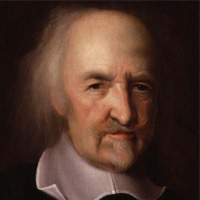Answer to Davenant’s Preface to Gondibert by Thomas Hobbes: An Overview
Thomas Hobbes unlike Henry Reynolds sounds like Cartesian (a follower of Descartes) who believes in rationalism and materialism. Going against the outrageous incongruities in fiction either in content of form, Hobbes want to set a boundary of the possibility of nature that an artist, he holds, should not exceed.

Thomas Hobbes (1588-1679)
For Hobbes the artist cannot go beyond the probabilities in nature drifting away from realism to the world of imaginary fantasy. He rejects mythopoeic visionary grandeur that an artist should take recourse. In the sense he is not in favor of supernatural elements in art. The subject matter of the poetry is the manners of human beings. In the form too, he rejects majestic and grand style in favor of consistent and decorum.
The poets should have considerable knowledge of the real world. They cannot transgress the boundary of nature. Impossibility in nature cannot be the subject of their poetry. Hobbes also talks about poetic judgment. He says, “Time and education begets experience; experience begets memory; memory begets Judgment and Fancy: Judgment begets the strength and structure and Fancy begets the ornaments of a poem” (203). So, poetic judgment should be enriched with learning plus imagination and memory.
Hobbes concentrates on the variety of poetry that depicts the qualities and virtues of human beings. He has divided the universe into three categories, each part representing human position. The first part is celestial where prince and heroes are found, and is always influential. The second is aerial which is always mobile and purity is not found; the third is the earth/terrestrial, which is always constant. On the basis of these three categories, he differentiates three kinds of poetry in accordance to the people and their intention. We find heroic poetry in court, satirical poetry in city, and pastoral poetry in country life. He says that the poet should imitate human activity and the imitation as subject matter should not be something, which is not possible in nature. A poet has to rely on his own experience and knowledge of human nature.
Hobbes classifies poetry as heroic poetry, satirical poetry, and pastoral poetry. However, his idea concerns on epic poem of Devanant’s Gondibert who violated the rules of writing epic and praise in the traditional form. For Hobbes, if the poet has got his own skill, then he can violate the rules of writing epic and praises Devanount for violating the rules of epic in Gondibert. Hobbes says that the three things like strength, structure and ornaments give birth to epic. According to him, fancy is very important because it is something creative. So, it is fancy, strength, structure and ornaments that contribute to form an epic. Hence, all these four are creative faculty.
In this way, Hobbes comments on the preface of Gondibert. He does not mean that he is against heroic poetry, but he only wants to make it real-like.
Thomas Hobbes Study Center
 |
bachelorandmaster.com |